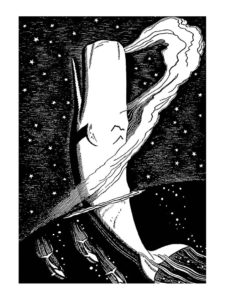PROVINCETOWN — “We don’t want thunder, we want rum!” bellowed reader Larry Williams, channeling the urgency of a stormy scene from Herman Melville’s classic novel, Moby-Dick; or, The Whale.
When readers at the Provincetown library’s annual Moby-Dick marathon went theatrical on the weekend of April 29-May 1, the starboard side of the Rose Dorothea — the half-scale “Indian Head” schooner model on the second floor of the library — provided the perfect setting for their performances.
Beside the ship, pier-style white lampposts lined the way to the reading area, and a whiteboard marked the current reader number like the sign at a deli counter.

This year marked the seventh marathon weekend and the first in-person event since 2019, organizer Brittany Taylor, the library’s assistant director, said after the reading. When the pandemic forced the event online in 2020, librarians asked readers to send videos explaining their love for Moby-Dick. It has “never been my favorite novel,” Taylor said in an April 29 interview on WOMR. So, fans’ responses — “people are wildly excited” — surprised her.
Maybe it’s because the book’s different sections — from the more “esoteric” chapters on the taxonomy of whales to the theater of the quarterdeck scene, structured like a play with stage directions — lend appeal to different readers, she guessed.
Stephen Borkowski, a library trustee and one of the original marathon creators, said he thinks part of the thrill is the way the book situates one of Provincetown’s big roles in history. It’s remarkable, he says, to think that “in Fiji, people wouldn’t have known about New York or Boston, but they would have known Provincetown.”
Part of the book’s enduring importance, Borkowski adds, is its “complete and articulate description of the industry.”
The book’s completeness is not up for debate, and Taylor acknowledged it is both long and dense.
Maybe people are drawn to the marathon, Taylor said on second thought, because the reading is an act of endurance that reflects the seaward undertakings Melville describes.
To fill the 111 five-page reading slots, Taylor said, requires some serious outreach to past and possible new readers. “Anyone you can think of, I emailed,” she said.
“It’s a testament to Provincetown that for the most part we get that number of readers every year,” she added. Town Manager Alex Morse opened the marathon this year, but Borkowski fondly remembers the opening of the first marathon in 2016, when whale-obsessed author Philip Hoare gained special permission to begin his reading on the Rose Dorothea, and then jumped from ship to floor-level stage mid-passage.
Hoare, Borkowski said, once described Moby-Dick as the “queerest book imaginable,” especially, he added, in chapters 93 and 94, which he called “the raciest chapters.”
Local actor Paul Haley performed the quarterdeck scene this year. And Mike Packard, the lobster fisherman who famously found himself inside a whale last summer, read the Jonah and the Whale sermon. Packard could not be reached for comment on the accuracy of Melville’s description of a whale’s insides.
Reading aloud can offer a different way into a book. “I didn’t read it when I was supposed to in high school,” said Larry Williams, who is from Western Mass., admitted after his Sunday reading. “But now, doing something with the voices allows me to hear the depth of the story.”
This reporter clocked in as reader number 99 at page 521. To prepare, I’d recorded myself reading the section in whispered tones and then played the recording on a loop underneath my pillow as I slept — an Orwellian yet effective practice I learned when reading Brave New World in high school.
In my section, Captain Ahab discovers the compass’s needle has been altered by a lightning strike, and he rushes to fix the ship’s course and bolster the crew’s mood. Though my selected passage was full of descriptive sentences detailing binnacles, the home for a ship’s compass, and spars, the wooden pole for a sail, it was also filled with punchy dialogue, wit, and cultural references.
Was I inspired to sit down with the classic text after the reading? Perhaps, but even if I don’t slog through chapters on blubber to reach the book’s tragic end, I am inspired to view the iconic text as a living document, given vulnerability and life by strangers reading in a once-prominent fishing capital.
And, when in a storm, whether in a library chair or a ship’s bow, I’ll always remember a wary regard for thunder, and a healthy preference for rum.



